By DALCY LULUA
THERE is a misconception in Papua New Guinea that PNG Customs has the authority to stop and inspect almost every import at the border before it reaches consumers, which is not true, says Chief Commissioner of Customs, David Towe.
“People think we can stop everything, but we can’t. There is a Recordation Process that gives us the authority to intervene at the border,” Towe explained.
“The authority is given by the rights holder, and if we don’t have that authority, we cannot intervene because we have no right to do so.”
He explained the process for obtaining a brand name or trademark, which allows Customs to intervene.
“Companies without a trademark or Intellectual Property Rights (IPR) need to register under the Intellectual Property Office (IPO) at the Investment Promotion Authority (IPA). If you have a brand, register it with the IPO, which will issue a trademark certificate. Once you have that, bring it to Customs, and we will record your trademark. Trademarks are private rights, meaning only you have the rights over the product.”
Mr. Towe stresses that by recording with Customs, companies give Customs the authority to intervene at the border when an imported product carries their trademark.
“Once Customs detects that, we verify whether you have imported that product or you have authorized someone to import that product. If you say that you haven’t imported the product, it means someone has infringed on your rights…. and we stop the product,” Towe said.
He stressed that without recordation, Customs cannot stop products, as there would be no legal basis to do so.
“It would be illegal for us to stop a product without authorization because the importer can challenge our actions,” Towe added.
Meanwhile, he stressed the need for PNG Customs to raise awareness about the importance of registering trademarks to allow Customs to intervene when trademark laws are infringed at the border.

